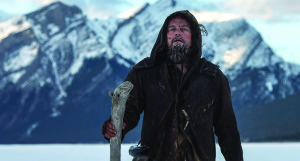“As long as you can grab a breath, you fight.” These opening words whispered by an unkempt Leonardo DiCaprio set the tone for The Revenant, a visually assaulting cinematic masterpiece that explores the sheer brutality of the human condition.
Directed by acclaimed filmmaker Alejandro González Iñárritu (Birdman, Amores Perros, Babel), The Revenant follows the grueling story of Hugh Glass (DiCaprio), a fur-trapper in the untamed 19th century American Midwest. Early into the film Glass gets mauled by a bear in what might be the most viscerally affecting scene of the entire movie (this is saying a lot, as we also witness DiCaprio devour raw bison liver, crawl inside of a horse carcass for warmth, and descend down an icy waterfall). His throat and back are violently ripped open by bear claws, and we hear DiCaprio’s expertly agonized cries, the sound of bones crunching. Glass somehow manages to kill the bear, but his half-Pawnee son Hawk (Forrest Goodluck) and companions find him in grim condition. There’s nothing like seeing someone’s throat get ripped out to remind you that your own day isn’t going so badly.
 It’s no accident that despite the violence that saturates the film, the setting and cinematography are devastatingly gorgeous. Shot entirely with natural light, the beautiful scenes of nature form an interesting contrast to Glass’s suffering, perhaps as a testament of nature’s callous unconcern.
It’s no accident that despite the violence that saturates the film, the setting and cinematography are devastatingly gorgeous. Shot entirely with natural light, the beautiful scenes of nature form an interesting contrast to Glass’s suffering, perhaps as a testament of nature’s callous unconcern.
After the attack, Glass’s companions and son valiantly attempt to carry him back on a makeshift stretcher, but the journey is too far and the weather becomes dangerously cold. Companions John Fitzgerald (Tom Hardy) and Jim Bridger (Will Poulter) are nominated to stay behind with Glass, if only to give him a proper Christian burial. It’s the decent thing to do.
Glass is in terrible shape, but it’s clear he’s still fiercely fighting for his life. Unfortunately Fitzgerald doesn’t seem to care about this. When he sees Glass’s wounds he dismisses him as “already dead” and believes waiting behind is a dangerous waste of time. After all, his fur-trapping companions are getting further and further away while he is stranded in the wilderness. This is not to defend Fitzgerald; his motivations are mercenary and he remains the scummiest of scumbags. Fitzgerald dupes Bridger into leaving the still-breathing Glass behind, but not before throwing him into a freshly dug grave. What makes this scene so frustratingly poignant is Glass’s utter helplessness when confronted with betrayal. He cannot speak or move, only stare in rage at his betrayer. The range of emotion DiCaprio is able to convey with grunts is astonishing; if this performance doesn’t finally win him an Oscar, I’ll eat raw bison liver.
The Revenant is a story of raw endurance. Driven forward by a thirst to revenge himself against Fitzgerald, Glass crawls up from the grave and begins his long journey of both survival and vengeance. We see the desperate lengths he goes to survive, and we are disgusted and impressed. The movie serves as a reminder of our own mortality: as we watch Glass gut a dead horse in order to crawl inside its warm body we may shudder, but we also understand.
When Glass finally succeeds in revenging himself on Fitzgerald, it feels perfectly unsatisfying. Glass’s sole motivation for survival is over; Fitzgerald’s death fades and falls in line with the rest of the carnage in this film. If Glass’s success feels anticlimactic, perhaps that is the point.
